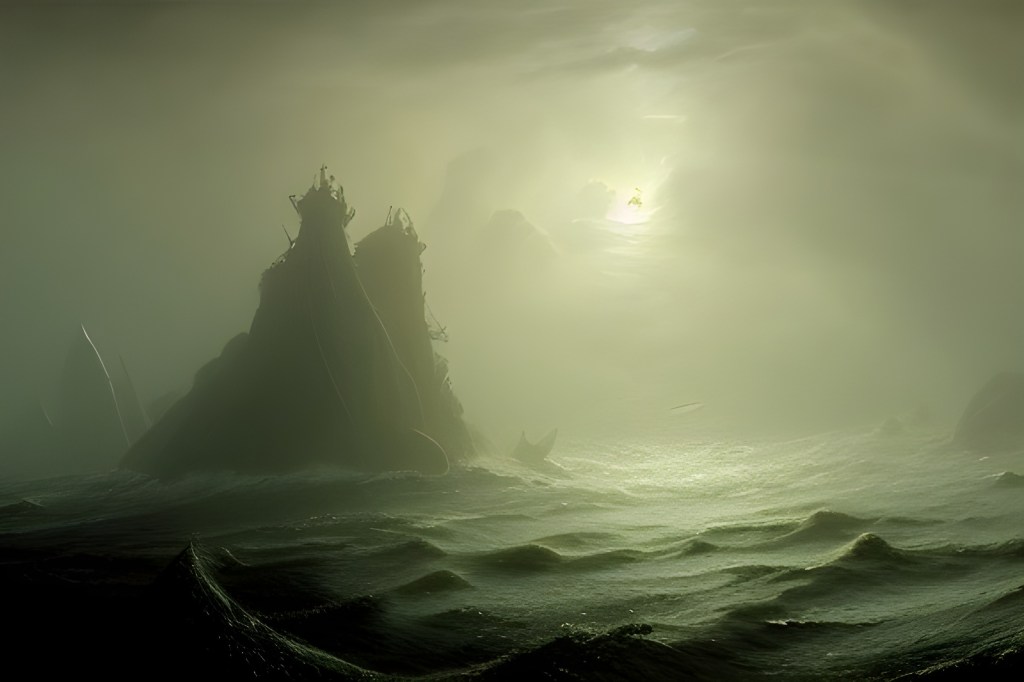From the Maori Folklore of the Cook Islands
In Shady-Land (Marua) there lived the brave Ngaru, his mother Vaiare, and the grandfather of the lad, who was no other than Moko, or Great Lizard, the king of all lizards. Tongatea, the youthful wife of Ngaru, was the envy of all Shady-Land on account of her fairness. Thirsting for distinction, Ngaru resolved to try his strength against some of the numerous monsters and evil spirits of his time. He learned from his grandfather that two fierce enemies of mankind had their appropriate home in the ocean, viz. Tikokura, or the-storm-wave, and Tumuitearetoka, or a vast shark, which fed exclusively upon human flesh. These evil spirits always went in each other’s company; but Ngaru determined to meet both. The enterprise seemed hopeless; for who had ever escaped their anger? Ngaru’s first care was to provide himself with a surf-board of the lightest description, which he named Orua, ‘the-two,’ in allusion to the two sea-gods he was about to encounter.
He now appeared on the inner edge of the reef, carrying his surf-board; but the wide coral surface was perfectly dry. Moko sat on a projecting crag of rock to watch over the safety of his grandson, who now advanced to the outer edge of the reef, where the surf ceaselessly beats, and loudly cursed these sea-monsters by name. Tikokura and Tumuiteatetoka smarted under this unprovoked insult, and resolved to be revenged on Ngaru without delay. All of a sudden the dead calm which had made the reef dry changed into a furious tempest. Long breakers rushed inland far beyond the accustomed bounds of the sea, and spent themselves against the gnarled roots of the utu trees. Moko still kept his place on his rocky eminence, whilst his grandson floated daringly out to sea on the crest of the retreating billow.
The shark-god, perceiving his opportunity, crept stealthily behind his intended victim, and was preparing for the final leap which would seal the fate of the impious Ngaru, when the quick eye of Moko caught sight of his dark outline, and shouted lustily to the boy, “The shark is under you.” Nagaru, hearing this, instantly leapt high in the air, so that this first attempt failed. The foe now leapt in the air after Ngaru; but he dived under the water and again escaped. The disappointed god was excessively enraged; so that it was needful for Ngaru to put forth all his skill and strength to avoid the open jaws of the monster. Tumuitearetoka became crafty; but Ngaru was still craftier: Moko often giving his pet grandson timely warning of the insidious approach of the adversary. For eight weary days and nights this terrible contest went on, until the exhausted Ngaru put an end to it by throwing his surf-board to the sea-monsters, who gladly retired to their ancient haunts in the deep blue ocean.
Great was the delight of the old grandfather and of his countrymen at the exploit of Ngaru, the first who had dared the sea-gods in their own dominion, and yet had escaped with life. But the hero himself was sadly battered, and his skin excoriated with the sharp coral. He made his way home; but on the road fell in with his fair wife Tongatea. Arrived at a fountain, they determined to bathe; but a friendly arranged that the husband should take the precedence. Once in, Ngaru was in no hurry to get out. At sunset he got out, and the wife was horrified to find that his skin had become almost black through long exposure to salt-water, during the mighty contest with the monsters of the deep. Reviling Ngaru for his blackness, she ran off to her friends.
When at length Ngaru reached home, Moko inquired what had become of his fairy spouse, and learnt that, disgusted with her husband’s appearance, she had fled to Teautapu. Said Moko, “Nothing blackens the skin so soon as the sea and the sun.” The grandson inquired how his skin could be blanched. Moko said, “The only way to blanch your skin is to treat you as green bananas are treated when they are to be ripened.” Ngaru agreed to this proposal. Accordingly they dug a deep hole in the ground, and lined it with layers of sweet-scented fern-leaves. Ngaru descended into this hole, and was duly covered with leaves; a thin layer of earth crowned the whole. On the eighth day flashes of lightning proceeded from the spot where Ngaru had so long been buried, increasing in intensity until it smote away earth and leaves, permitting him to emerge from his strange abode.
It then became evident that these flashes of light proceeded from the face and person of Ngaru, being in reality the dazzling fairness of his skin. But there was one drawback: the steam of the blanching over had rendered Ngaru perfectly bald. Moko sent his mother Vaiare to great Tangaroa, to ask for some new hair. It was given; but when Moko examined it, it proved to be frizzly. Moko resolved not to spoil the head of his fairy grandson with such a wretched mop. Vaiare took it back to the god, and asked for some better hair. Tangaroa put the supplicant off with some light yellow. “This will never do,” said Moko; “I must have the best.” Once more Vaiare trudged back to the god to beg him to exchange the hair. Finding that there was no escape from the importunity of the grandfather, Tangaroa gave a profusion of wavy, smooth raven locks. Moko was delighted, and gladly secured it to the bald pate of his fair grandson.
The lightning, or dazzling flashes of light, from the face and person of Ngaru reached even to the distant abode of Tongatea (the fair Tongan), so that everybody said, “Behold the dazzling fairness of Ngaru!” Said the runaway wife, “This Ngaru you praise must be a different individual from the Ngaru I know.” The bystanders asserted that it was her despised husband; but Tongatea remained incredulous.
Now, Tongatea had got up a reed-throwing match for women; but men were invited from all parts to decide upon the merits of the game, and to applaud the successful throwers. At the time appointed all the fair ones, gaily attired and covered with fragrant garlands, stood ready to being the amusement of the day, each with a long reed in her right hand. Tongatea, as mistress of the day, was about to make the first throw, when Ngaru made his appearance, and was at once recognized by the fair runaway. Her arm fell powerless by her side. She struggled to conceal her emotion, and to proceed with the game, but could not. Such a violent tremor seized Tongatea, that it was with difficulty that she retained her garments about her person. All was confusion: the intended sport of the day was lost. As the visitors disappeared, the weeping, repentant, love-smitten wife followed Ngaru, entreating him to return to her. Ngaru, in whose heart still rankled the bitter insult in reference to his former dusky colour, in this moment of triumph said to the penitent, “Never will I return to thee.” The despairing Tongatea hearing this, set off in search of some poisonous kokii kura, chewed it, and died.
Source:
Myths and Songs From the South Pacific, William Wyatt Gill, 1876





